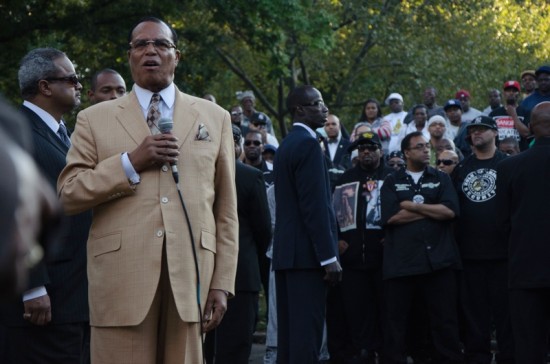
Calls site where 4-year-old boy was slain sacred ground
Minister Louis Farrakhan, the controversial leader of the Nation of Islam, brought his nationwide anti-violence campaign to a public housing project in Morrisania on Sunday – to the same spot where 4-year old Lloyd Morgan was shot and killed two months ago.
Residents and neighbors of the Forest Houses on 165th St. flocked to windows and slowly emerged from doorways late Sunday afternoon as 50 or so Nation of Islam members marched through the community spreading the word that Farrakhan was coming.
“Nobody knew until today, none of us,” said Odetta Murph, a longtime resident. “They came and knocked on our door and said Farrakhan was coming.”
Farrakhan, who noted that he was born in the now-closed Morrisania Hospital in Highbridge, told a crowd of more than 200 onlookers that the path to unity and love has to be forged on the streets where violence takes place.
“Who needs to be in the mosque when our problems are not in the mosque? Why do we need to be in church when everyone in the church is already saved?” Farrakhan said on a basketball court at the Forest Houses, just yards from where Morgan was struck in the head by a stray bullet on July 22. “This is sacred ground.”
Morgan’s death fueled a wave of concern around the city about rising gun violence over the summer. Police have arrested three people, including a 17-year-old boy, for allegedly firing into a crowd gathered for a memorial basketball game near where Morgan was playing.
The Nation of Islam’s Unite for Peace tours have taken place in over 100 cities nationwide. Farrakhan said Morrisania is his first stop in New York City, with further events planned in Queens and Brooklyn. Hip-hop pioneer and South Bronx native Afrika Bambaataa, and his Zulu Nation organization, cosponsored the event.
Bronx Borough President Ruben Diaz Jr. and Assemblyman Eric Stevenson hosted the annual Peace in Our Streets initiative at the Forest Houses the day before Farrakhan’s visit, but Diaz did not attend the Farrakhan event.
Stevenson said he attended because the community needs all the help it can get to solve the problem of violence.
“Anytime someone arrives to give words of peace and love I can be proud of it and support it,” Stevenson said. “Whether it’s Farrakhan or whoever, I applaud it.”
Farrakhan’s reputation is muddled with controversy, starting with his denunciations of Malcolm X in the months before Malcolm’s assassination in 1965. In the early eighties, Farrakhan was deemed “Black Hitler” by opponents for comments he made referring to Judaism as a “dirty religion.” He has since denied he is an anti-Semite.
Farrakhan, flanked by security, didn’t shy away from inflammatory remarks during his visit to Forest Houses. He accused black churches of taking advantage of grieving victims of street violence, and said white people demean African Americans.
“They see us as animals with no conscience and no feelings,” he said.
But some residents said the visit could have a positive effect because of Farrakhan’s message of personal responsibility.
“That right there, that’s going to bring black people out,” said Brent Hamilton, 23, as he pointed to the line of well-dressed Nation of Islam members marching and chanting down 165th St. “People will hear it from their windows and tell their kids to go and listen to this man.”
The only criticism by community members stemmed from their concern that his presence wouldn’t break through to the youth committing the violence.
“It’s something pretty,” said Benito Rosado, 71 as he lifted his head momentarily from his game of dominoes to glance at the gathering crowd, “but it will have no effect.”
